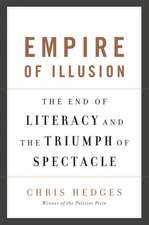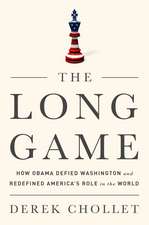The Invisible Arab: The Promise and Peril of the Arab Revolutions
Autor Marwan Bisharaen Limba Engleză Paperback – 7 ian 2013 – vârsta de la 13 ani
The
Invisible
Arabtraces
the
roots
of
the
revolutions
in
the
Arab
world.
Marwan
Bishara,
chief
policy
analyst
of
Al
Jazeera
English
and
the
anchor
of
the
program
“Empire”,
combines
on-the-ground
reporting,
extensive
research
and
scholarship,
and
political
commentary
in
this
book
on
the
complex
influences
that
made
the
revolutions
possible.
Bishara
argues
that
the
inclusive,
pluralistic
nationalism
that
motivated
the
revolutions
are
indispensable
to
their
long-term
success.The
Invisible
Arabis
a
voyage
in
time
from
the
Arab
world's
'liberation
generation'
through
the
'defeated'
and
'lost
generations',
arriving
at
today's
'miracle
generation'.
Bishara
unpacks
how
this
new
generation,
long
seen
as
a
demographic
bomb,
has
proved
to
be
the
agent
of
progress,
unity
and
freedom.
It
has
in
turn
used
social
networks
to
mobilize
for
social
justice.
Bishara discusses how Israel, oil, terrorism and radical Islam have affected the interior identity of the region as well as Western projections upon it. Protection of Israel, Western imperial ambition, a thirst for oil, and fear of radicalism have caused many Western regimes and media to characterize Arab countries and people as unreceptive to democracy or progress. These ideas are as one-dimensional as they are foolhardy. Bishara argues that the Arab revolutions present a great window of opportunity for reinventing and improving Arab ties with the rest of the world— notably the West—on the basis of mutual respect and mutual interest.
The revolutions will be judged by how they realize freedom and justice, and how they can pave the way for reconciling and accommodating nationalism and Islam with democracy. Bishara argues that these pillars—liberty and justice reconciled with religion and nationalism, form the bedrock that will allow stability and progress to flourish in the Arab world and beyond.
Bishara discusses how Israel, oil, terrorism and radical Islam have affected the interior identity of the region as well as Western projections upon it. Protection of Israel, Western imperial ambition, a thirst for oil, and fear of radicalism have caused many Western regimes and media to characterize Arab countries and people as unreceptive to democracy or progress. These ideas are as one-dimensional as they are foolhardy. Bishara argues that the Arab revolutions present a great window of opportunity for reinventing and improving Arab ties with the rest of the world— notably the West—on the basis of mutual respect and mutual interest.
The revolutions will be judged by how they realize freedom and justice, and how they can pave the way for reconciling and accommodating nationalism and Islam with democracy. Bishara argues that these pillars—liberty and justice reconciled with religion and nationalism, form the bedrock that will allow stability and progress to flourish in the Arab world and beyond.
Preț: 119.82 lei
Nou
Puncte Express: 180
Preț estimativ în valută:
22.93€ • 24.11$ • 18.94£
22.93€ • 24.11$ • 18.94£
Carte disponibilă
Livrare economică 27 martie-10 aprilie
Livrare express 12-18 martie pentru 23.99 lei
Preluare comenzi: 021 569.72.76
Specificații
ISBN-13: 9781568589749
ISBN-10: 1568589743
Pagini: 304
Dimensiuni: 140 x 210 x 25 mm
Greutate: 0.34 kg
Ediția:Updated
Editura: PublicAffairs
Colecția Bold Type Books
ISBN-10: 1568589743
Pagini: 304
Dimensiuni: 140 x 210 x 25 mm
Greutate: 0.34 kg
Ediția:Updated
Editura: PublicAffairs
Colecția Bold Type Books
Notă biografică
Marwan
Bisharais
Al
Jazeera
English's
senior
political
analyst
and
the
editor
&
host
of
“Empire”,
a
program
on
the
channel
that
examines
global
powers
and
their
agendas.
He
was
previously
a
professor
of
International
Relations
at
the
American
University
of
Paris
and
a
fellow
at
the
Ecole
des
Hautes
Etudes
et
Sciences
Sociales.
Bishara's
writing
has
appeared
inThe
New
York
Times,Washington
Post,Newsweek,The
Guardian,Le
MondeandThe
Nation,
among
other
outlets.
He
is
also
the
chairman
of
The
Galilee
Foundation,
a
UK
based
charity
that
provides
over
one
hundred
students
annually
with
university
scholarships.
He
lives
in
Washington
DC,
Paris,
and
Dohar.
Recenzii
“There
have
been
few
events
as
consequential
in
recent
history
as
the
Arab
Spring,
and
if
one
wants
to
understand
its
genesis,
one
should
read
this
book.
Engaging
in
a
regionwide
analysis
with
a
concentration
on
Egypt
and
Tunisia,
Bishara
brings
out
little-known
aspects
of
the
tremors
that
have
been
felt
around
the
world….
Bishara
presents
a
clear-eyed
assessment
of
the
dictatorships
that
have
blighted
the
Arab
landscape.”
Foreign
Policy
in
Focus
“Bishara
tears
down
the
Western
media’s
narrative
of
the
Arab
revolutions….[The
Invisible
Arab]
helps
make
all
that
was
invisible
to
the
Western
eye
about
the
Arab
Spring
visible.”
London
School
of
Economics
Review
of
Books
“The
Invisible
Arab is
a
small
book
that
pulls
a
lot
of
punches….Bishara’s
analysis
is
thoughtful
and
detailed.”
Foreign
Affairs
“[I]nformed
and
engaging…”
Thinking
Fits (blog)
“Marwan
Bishara’s The
Invisible
Arab… sings
like
a
canary…. The
Invisible
Arab is
at
its
most
resonant
when
reconstructing
the
building
blocs
of
Arab
misery
that
pinned
down
much
of
the
20th
century.”
Huffington Post
“An engaging new book…[Bishara] delivers a sweeping, provocative and at times entertaining tale, revolution jokes and all….The Invisible Arabis an insightful and absorbing read for inquiring minds, and a valuable tool for students of the Middle East. As globally resonant events continue to unfold in the region, a sequel is clearly in order.”
Newsweek / Daily Beast
“Avoiding the pitfall of seeing the revolution in isolation, Bishara elegantly charts how the potent forces of national-ism, Islamism, and Western intervention all mixed to create last year’s revolutions.”
ID:
International
Dialogue,
A
Multidisciplinary
Journal
of
World
Affairs
“[The
Invisible
Arab]
is
a
must-read
for
students
and
scholars
of
the
Middle
East
and
the
Arab
world….The
book
does
an
excellent
job
of
documenting
the
efforts
at
change,
and
suggesting
how
change
might
ultimately
occur.”
Wisconsin
State
Journal












